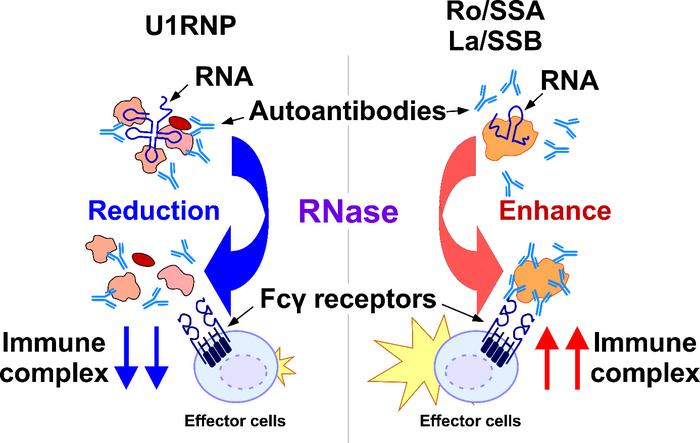Osaka, Japan – Systemic autoimmune diseases are characterized by inflammation of multiple organs and can have devastating consequences for patients. There is a dire need for treatments against these diseases. RNase treatments seem promising in some clinical trials but not all. Researchers from Japan have uncovered the reasons for this variability.

Credit: Ryota Naito et al. JCI Insight 2023, conceptual figure
Osaka, Japan – Systemic autoimmune diseases are characterized by inflammation of multiple organs and can have devastating consequences for patients. There is a dire need for treatments against these diseases. RNase treatments seem promising in some clinical trials but not all. Researchers from Japan have uncovered the reasons for this variability.
In a study recently published in the Journal of Clinical Investigation Insight (JCI Insight), researchers from Osaka University have provided new insights into the opposite effects of RNase treatment—enhancing and weakening immune activation.
The immune system defends the body. Essentially, it produces antibodies that bind to targets called antigens. Antibody–antigen complexes, also known as immune complexes, can then be eliminated. Autoimmune diseases happen when the immune system produces antibodies that recognize its own body components. Some autoimmune diseases affect one organ, such as pancreatic cells in type I diabetes, but systemic autoimmune diseases involve more. In some systemic autoimmune diseases, antibodies target nuclear proteins bound to RNA molecules. The resulting immune complexes stimulate the production of factors that activate the immune response, such as type I interferons. Because RNases can destroy RNA molecules, these RNA-containing immune complexes can be destabilized by RNases. Therefore, clinical trials have tested RNase treatment as a potential therapy for systemic autoimmune diseases. The results are promising, but they also reveal a paradox—RNase treatments can stimulate the autoimmune response. To understand this phenomenon, the researchers investigated the effects of RNases on the immune response.
“We hypothesized that the efficacy of RNase-based treatments depends on the localization of the RNA-binding site,” says Ryota Naito, lead author of the study. “Indeed, in some antigens, the sites binding to antibodies and those binding to RNA are very close. Removing RNAs might allow more antibodies to bind to the antigens and, consequently, stimulate the immune response.”
The team tested the effects of RNase treatment on the production of type I interferons induced by immune complexes isolated from patients with systemic autoimmune diseases. “We observed opposite effects of RNase treatment on the production of type I interferons, and the differences were directly related to the composition of the immune complexes,” says Hisashi Arase, senior author.
The researchers also confirmed the increased binding of antibodies to antigens in immune complexes that stimulated type I interferon production in the presence of RNase. Thus, RNase likely unmasked the binding sites for the antibodies when removing RNA from antigens. As a result, more immune complexes formed and stimulated autoimmunity.
This study provides insights into the mechanisms involved in systemic autoimmune diseases. It will most likely lead to better treatments for patients with these conditions.
###
The article, “Positive and negative regulation of the Fcg receptor-stimulatory activity of RNA-containing immune complexes by RNase,” was published in the Journal of Clinical Investigation Insight (JCI Insight) at DOI: https://doi.org/10.1172/jci.insight.167799
About Osaka University
Osaka University was founded in 1931 as one of the seven imperial universities of Japan and is now one of Japan’s leading comprehensive universities with a broad disciplinary spectrum. This strength is coupled with a singular drive for innovation that extends throughout the scientific process, from fundamental research to the creation of applied technology with positive economic impacts. Its commitment to innovation has been recognized in Japan and around the world, being named Japan’s most innovative university in 2015 (Reuters 2015 Top 100) and one of the most innovative institutions in the world in 2017 (Innovative Universities and the Nature Index Innovation 2017). Now, Osaka University is leveraging its role as a Designated National University Corporation selected by the Ministry of Education, Culture, Sports, Science and Technology to contribute to innovation for human welfare, sustainable development of society, and social transformation.
Website: https://resou.osaka-u.ac.jp/en
Journal
JCI Insight
DOI
10.1172/jci.insight.167799
Method of Research
Experimental study
Subject of Research
Human tissue samples
Article Title
Positive and negative regulation of the Fcγ receptor-stimulatory activity of RNA-containing immune complexes by RNase
Article Publication Date
11-Jul-2023




